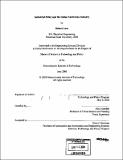Industrial policy and the Indian electronics industry
Author(s)
Love, Robert (Robert Eric)
DownloadFull printable version (28.12Mb)
Other Contributors
Massachusetts Institute of Technology. Technology and Policy Program.
Massachusetts Institute of Technology. Engineering Systems Division.
Advisor
Alice Amsden.
Terms of use
Metadata
Show full item recordAbstract
Recently, production within India's Electronics sector amounted to a low $12 billion when compared to the global output of $1400 billion. The slow growth in the local industry is often judged to be the result of late economic liberalization within India. This thesis argues that the lagging growth is more a result of premature liberalization, and policies geared toward promoting the wrong types of firms. This thesis seeks to move past the sole focus of much research on the burgeoning software and services sector and evaluate the growth of electronics, software, and design services as closely linked sub-sectors. The analysis is therefore performed with direct considerations of the most successful types of firms, who very often are involved in multiple sub-sectors. The variations in firm size, national ownership, and orientation toward the domestic or international markets are all key considerations within this thesis, concerning the effect these characteristics have on the performance of firms and the industry as a whole. Additionally, this thesis addresses issues of great concern within the industry and India as a whole, such as preserving employment opportunities. India has followed a non-traditional approach to economic development, and it is the goal of this thesis to clarify that approach and assess its sustainability. Thus, the focus of the research is two-tiered: to provide an overall appraisal of current policy in India's Electronics Sector, considering capabilities in core industries (i.e. machinery) and the software industry; and to provide recommendations - as needed - for decreasing the import reliance on the high value-added electronic components such as LCDs, integrated circuits, and other complex assemblies.
Description
Thesis (S.M. in Technology and Policy)--Massachusetts Institute of Technology, Engineering Systems Division, Technology and Policy Program, 2008. Includes bibliographical references (p. 97-100).
Date issued
2008Department
Massachusetts Institute of Technology. Engineering Systems Division; Technology and Policy ProgramPublisher
Massachusetts Institute of Technology
Keywords
Technology and Policy Program., Engineering Systems Division.